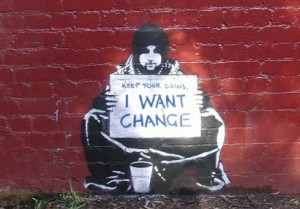Photo from Chapter 8 of Anodea Judith’s Waking the Global Heart.
One way that change happens – and certainly not the fun way — is the path of adversity. That’s when we get beaten so far down that we surrender. An alcoholic hits bottom; we run out of money; the sea level rises, oil sources dry up, the economy tanks, or civilization collapses. There’s lots of “doomers” out there who say that’s how it’s going to happen, that humans don’t change anything until they absolutely have to. From this perspective, humanity is headed straight toward its collective dark night of the soul.
Such dark nights are a time of deep listening. So many people I meet these days are in a state of confusion, not knowing quite what to do right now. The “I don’t know” means we are open to ideas, instruction, guidance. A collective “We don’t know” would mean we have to listen to each other, to the earth, and to the divine intelligence that is actually running the place. Dark nights lead to deep systemic change.
There’s another way change happens that’s a lot brighter and easier. It’s simply having a better idea. We didn’t need a failure of the typewriter industry to switch to desktop computers. Nor did main frame computers have to self-destruct for us to buy laptops or smartphones. We just self-selected for superior performance. When small groups of people get together and start doing things differently — and are successful at it — people around them start taking notice. They look over and say: “I want what she’s having!”
The yoga movement that’s sweeping the world is a case in point. You go to a party and run into a friend you haven’t seen in five years. She looks great, fit and shining with light. You ask: “Wow, you look good. What have you been doing?” It might be yoga, or it might be a good diet, meditation, or a new kind of snake oil, but it’s the success that makes you want to try it. As new ideas form on the edge and people find benefit, these ideas grow into movements. What works expands and evolves. People want to join.
In Tapscott and William’s book Wikinomics: How Mass Collaboration Changes Everything they show how companies that collaborate are making more money than those that have full time R & D personnel. Wikipedia out-performs the old encyclopedia sets. Countries like Germany are shifting their taxes from income to ecotax and have created a green industry with 250,000 new jobs.
What if there were a subset of the UN called the Union of Peace Nations? If a nation was willing to get rid of nuclear weapons, keep their military down to a small fraction of their national budget, agree to human rights principles, and other such things, they could have protection from other countries. Meanwhile these countries could balance their budget, rebuild their schools, give their citizens healthcare, develop green technologies. They could prosper and be a model for others who would then want to “get in on the club.”
What it takes is showing that something works better, then getting more people involved. As it grows, we get better at what we’re doing. We get more visible. We’re not knocking anything down, we’re simply galloping beyond it.
As Mark Gafni said at the World Spirituality Center opening, we’re transcending, which is ending the trance.
Anodea Judith
April 8, 2011





